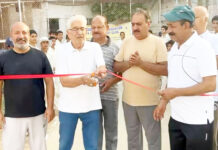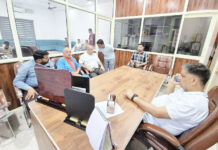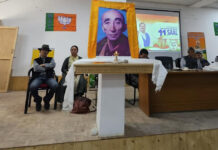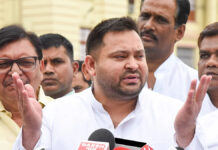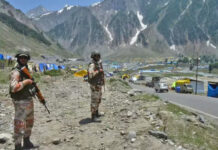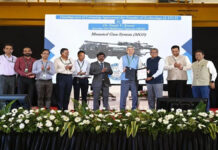Srinagar: Kashmir hardline separatist Syed Ali Shah Geelani’s son-in-law, Altaf Ahmed Shah, was today questioned by the National Investigation Agency (NIA) in connection with its probe into the funding of terror and subversive activities in Kashmir. Shah, popularly known as Altaf Fantoosh, arrived at the NIA headquarters here this morning and was questioned by a team of officials about the alleged funding of the Geelani-led Tehrek-e-Hurriyat, offical sources said. His Srinagar house was raided by NIA sleuths, who also searched the premises of others, such as Shahid-ul-Islam, a close aide of Mirwaiz Umer Farooq, who heads the moderate faction of the Hurriyat Conference, and businessman Zahoor Watali.
The NIA had collected “some material” from Shah’s residence which was scrutinised by the sleuths before he was called for questioning here, the sources said, adding his examination would carry on for a few days before his statement was recorded. Apart from being the son-in-law of Geelani, Shah is percieved to be influential in the policies of the Tehrek-e- Hurriyat. The NIA had conducted raids last Saturday and Sunday on the residences of separatists and businessmen in the Kashmir Valley, Jammu, Delhi and Haryana’s Sonepat and Gurgaon. Among those raided were separatists Ayaz Akbar, Peer Saifullah, Nayeem Khan and Farooq Ahmed Dar alias ‘Bitta Karate’.
Hafeez Saeed, Pakistan-based chief of Jamaat-ul Dawah, the front of the banned Lashker-e-Taiba (LeT), has been named in the FIR as an accused besides organisations such as the Hurriyat Conference (factions led by Geelani and Mirwaiz Umer Farooq), Hizbul Mujahideen (HM) and Dukhtaran-e-Milat. The raids were part of NIA’s efforts to clamp down on separatist groups allegedly receiving funds for subversive activities in the valley.
The NIA had recovered unaccounted account books, Rs 2 crore in cash and letterheads of banned terror groups including LeT and HM. The NIA investigation also seeks to identify the chain of players behind the financing of terrorist activities, including those who threw stones at security forces, burned down schools and damaged government establishments.
Bank accounts and lockers revealed during the probe had been frozen.
Besides electronic gadgets, phone diaries and documents such as rough receipts and vouchers had been seized from alleged hawala operators, financiers and office bearers of separatist groups. During the searches, a few thousand Pakistani rupees and currencies belonging to the UAE and Saudi Arabia as well LeT and HM letterheads were seized by the NIA.
The NIA has alleged that since cross-LoC trade, at Uri in Kashmir and Chakan-da-bad in Jammu, was based on a barter system, some businessmen “under- or over-invoiced” their bills, and the difference in payment was later used for promoting subversive activities in the valley.
This is for the first time since the rise of militancy in Kashmir in the early 1990s that a central probe agency has carried out raids in connection with funding separatists. In 2002, the Income Tax department had executed searches against some separatist leaders, including Geelani, and seized cash and documents. However, no criminal case was registered then.
The NIA has also roped in the government’s cyber security arm to analyse electronic evidence collected during its raids.
Twenty-two laptops and computers, 100 mobiles and nearly 200 pen drives and memory sticks had been sent to the Computer Emergency Response Team-India (CERT-IN) for creating backup files. The CERT-IN will also provide other technical details related to the data, the sources said. The CERT-IN has also been asked to look for deleted material in the electronic gadgets, they said.
The NIA raids were carried out following the questioning of three separatist leaders — Nayeem Khan, who was seen on TV during a sting operation purportedly confessing to receiving money from Pakistan-based terror groups, ‘Bitta Karate’ and Gazi Javed Baba of the Tehreek-e-Hurriyat, in the national capital last month

